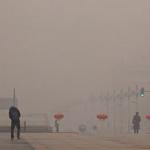China's Air Pollution Leading to More Erratic Climate for US, Say Scientists

China's air pollution could be intensifying storms over the Pacific Ocean and altering weather patterns in North America, according to scientists in the US. A team from Texas, California and Washington state has found that pollution from Asia, much of it arising in China, is leading to more intense cyclones, increased precipitation and more warm air in the mid-Pacific moving towards the north pole.
According to the team's findings, which were released on Monday in the Proceedings of the National Academy of Sciences, these changes could ultimately contribute to erratic weather in the US.
The authors used advanced computer models to study interactions between clouds and fine airborne particles known as aerosols, particularly manmade ones such as those emitted from vehicles and coal-fired power plants.
"Our work provides, for the first time to the authors' knowledge, a global multi-scale perspective of the climatic effects of pollution outflows from Asia," says the study's abstract.
One effect, the study says, is an "intensification of the Pacific storm track", a narrow zone over the ocean where some storms that pass over the US begin to gather.
"Mid-latitude storms develop off Asia and they track across the Pacific, coming in to the west coast of the US," said Ellie Highwood, a climate physicist at the University of Reading. "The particles in this model are affecting how strong those storms are, how dense the clouds are, and how much rainfall comes out of those storms."
China is fighting to contain the environmental fallout from 30 years of unchecked growth. Of 74 Chinese cities monitored by the central government 71 failed to meet air quality standards, the environmental ministry said last month.
China's top leaders are aware of the extent of the problem. Beijing will soon revise an important piece of legislation and give environmental protection authorities the power to shut polluting factories, punish officials and restrict industrial development in some areas, Reuters reported on Tuesday.
The changes to the China's environmental protection law, the first since 1989, will legally enshrine oft-repeated government promises to prioritise environmental protection over economic growth.
Cao Mingde, a law professor at the China University of Political Science and Law, told the newswire that upholding environmental protection as a fundamental principle was a huge change. "It emphasises that the environment is a priority."
Although the legislation's fourth draft is nearing completion, it is still short on details, according to the report. China's legal system is often hostile to pollution-related litigation.
On Monday, a Chinese court rejected a lawsuit by five residents of Lanzhou, a city in the country's north-west, over an incident last week when dangerous levels of the carcinogenic chemical benzene were detected in the water supply. The residents demanded damages, a public apology and water quality data from the city-owned water company.
According to a local newspaper, the court claimed that under civil procedure law, the litigants were unqualified to sue; in pollution-related cases only "agencies and organisations" could press charges, and they needed official authorisation to take action.
